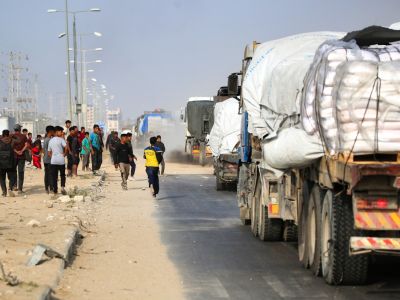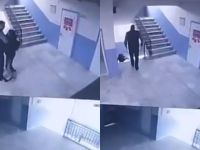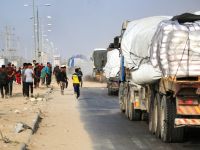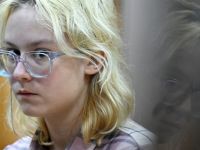Israeli troops shot dead five Palestinians in a fresh upsurge of violence on Sunday as a defiant Palestinian leader Yasser Arafat warned that the Intifada will continue.
Israeli Prime Minister Ehud Barak, meanwhile, struggled to keep his government alive, holding an inconclusive two-hour meeting with hawkish Likud party leader Ariel Sharon on forming a national emergency government.
Barak said earlier that he was ready to hold peace talks if there were a drop in the violence that has set the Palestinian territories ablaze over the past month.
On the ground, Israeli troops sent tanks rolling into the Gaza Strip, opening fire with heavy machine guns near the Karni border crossing to clear a road used by Jewish settlers and killing at least one Palestinian.
Another two Palestinians were shot and killed in the West Bank town of Nablus where thousands marched through the city to mourn the death of another man who died of injuries sustained on Friday.
A teenage boy died after being shot by an Israeli bullet in Rafah in southern Gaza, while a 20-year-old Palestinian was killed in the West Bank town of Jenin.
The Israeli army also reported that a bomb exploded near a military-escorted bus travelling near a Jewish settlement in the Gaza Strip, three days after an Islamic militant blew himself up in a suicide attack against an army post in the region.
The death toll has now swelled to 150 since a controversial visit by Sharon on September 28 to the al-Aqsa mosque compound in occupied east Jerusalem, a site sacred to both Jews and Muslims.
"The army will confront this situation whether it lasts a month or a year," army chief Shaul Mofaz declared Sunday.
Equally defiant, Arafat warned the uprising against Israel would continue until his people could claim Jerusalem as their capital, with the Palestinian leadership due to meet in two weeks to discuss plans for declaring an independent state.
"The Palestinian people will persevere until a boy or a girl raises the Palestinian flag in Jerusalem, our Palestinian capital," Arafat told reporters after opening a half-completed emergency hospital in Gaza.
Arafat was due to travel Monday to Egypt to consult with President Hosni Mubarak, a key ally, an official told AFP.
Barak, who a week ago declared a time-out in the seven-year Oslo peace process with the Palestinians, held talks with Sharon on forming a political union that the Palestinians and even members of his own cabinet have warned could kill peacemaking efforts.
The meeting, on the eve of a crucial parliamentary session, broke up after two hours without an agreement, Israeli radio reported, saying differences remained over Sharon's demands for a right of veto over peace and security decisions.
However, the radio said Communications Minister Binyamin Ben Eliezer, who is close to Barak, and Likud MP Meir Sheetrit had been charged by their leaders to try to find a compromise.
"We are ready to envisage a broader emergency government and we are also ready to function with the security net which the Shas party has proposed during this emergency situation," Barak told public radio.
He was referring to a decision by the ultra-Orthodox Jewish Shas, a lynchpin in successive coalitions, to back the government from outside to deal with the explosion of violence across the Palestinian territories.
Without a deal Barak, who has been leading a minority government for three months, could face a call for early elections when parliament returns after a three-month break on Monday.
But Barak also held out the prospect of a revival of peace talks if the violence in the territories eases.
"We are committed by the Sharm el-Sheikh accord and we want to see if it is possible to re-launch the peace process," Barak said, referring to the agreement reached with the Palestinians to quell the street battles.
"If the violence drops we will go to Washington to see if there is something to discuss," he said, but added: "Our Palestinian partners are more complex than we thought and peace is more difficult to achieve than we thought."
And he told his cabinet there was no "significant decline" in the violence.
US President Bill Clinton, who had invited both Barak and Arafat for separate talks in the United States, has said there could be no negotiations until the violence eased.
Acting Israeli Foreign Minister Shlomo Ben Ami is to visit Washington as well as Paris and London in the coming week.
In other incidents Sunday, Israel said there had been an exchange of fire from an unknown source and an Israeli army unit, the second such incident in a week, but Beirut denied there had been any firing from Lebanon.
Hundreds of Palestinians also staged a demonstration by the Fatima crossing with Lebanon, near the Israeli town of Metullah.
"We are witnessing a general heating-up at the Lebanese-Israeli border and our troops are ready for any eventuality," an army spokesman said – JERUSALEM (AFP)
© 2000 Al Bawaba (www.albawaba.com)









